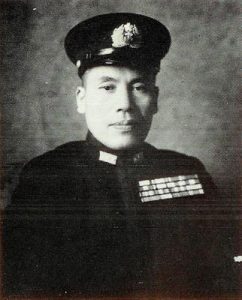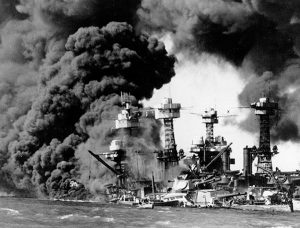Three days ago the U.S. remembered the Japanese attack on Pearl Harbor on December 7, 1941. I was going through my files a couple of days later and ran across this story that I wrote in 1989 when I was the Chicago Tribune’s Tokyo Bureau Chief and Chief Asia Correspondent.
The story was a profile of a man named Admiral Zenshiro Hoshina, who at the time was 98 years old. When I interviewed Hoshina, he was the last surviving member of Imperial Japan’s top wartime leadership and the only man still living who was with Emperor Hirohito in the imperial bunker when he made his decision to surrender in August 1945.
When he joined Emperor Hirohito in the Imperial Palace bunker along with 23 other military leaders, Admiral Hoshina was secretary-general of the Imperial Navy Ministry and chief of Japan’s Military Bureau.
A 1931 graduate of Yale University, Admiral Hoshina was a vociferous opponent of the attack on Pearl Harbor and spent the early part of the war in a futile attempt to negotiate a cease-fire or some other peaceful end to the hostilities. Hoshina died in 1991 at the age of 100.
I hope you will find this story thought-provoking as we look back on the 80th anniversary of the attack on Pearl Harbor.
Japan’s last war leader tells of lifelong regret: “Japan should never have attacked Pearl Harbor”
By Ronald E. Yates
When the world paused to reflect on the people and events responsible for starting World War II 48 years ago, Zenshiro Hoshina had a little more than a detached interest in what people were writing and saying.
Hoshina, 98, is the last surviving member of Japan’s top wartime leadership and the only man still living who was with Emperor Hirohito in the imperial bunker when he made his decision to surrender in August 1945.
He was also one of the few voices in Japan’s aggressive, anti-American government in 1939 to oppose Imperial Japan’s invasion of China and its 1941 attack on Pearl Harbor.

“There was no way Japan could have achieved a military victory against the United States,” said Hoshina in a rare interview. “Japan had too many enemies and not enough resources. But above all, Japan didn’t have enough accurate information about America and its military-industrial capabilities.”
As secretary-general of the Imperial Navy Ministry and chief of Japan’s Military Bureau, Hoshina not only was involved in coordinating the logistics needed to keep the Imperial Japanese afloat, he also helped plan the navy’s role in the war.
All the while, however, Hoshina, a graduate of Japan’s Naval Academy in 1924 and a 1931 graduate of Yale University, where he studied American history, was counseling the late emperor against the war.
“It is my lifelong regret that I was unable to make Japan avoid war with America,” said Hoshina, sitting in his office at the Japan Defense Association in Tokyo’s Nagatacho district, Japan’s version of Capitol Hill.
Behind Hoshina on a desk cluttered with papers and books was a plastic model of a World War II-era Japanese Zero fighter plane and a model of the legendary battleship Mutsu, which he once commanded.
“I blame the Imperial Japanese army for starting the war,” said Hoshina, running his hand through thinning white hair. His words, still angry after so many years, were muffled by a small office filled with file cabinets, bookshelves, war-era mementos and old photographs, including one of him strolling on the deck of the Mutsu with the late emperor.
“The army’s generals continually interfered in areas of diplomacy without informing the foreign ministry,” Hoshina continued, shaking a stubby finger at the ghosts of men long dead. “For example, they were intent on occupying China and bragged that they could do it with just one division.”
In an effort to forestall war and undermine the power of Japan’s bellicose military officers, Hoshina formed a committee of the top army, navy, and foreign ministry officials and drafted rules that in effect forbade the military from dabbling in foreign policy.
“The emperor was supportive of this and told me so, but I was not allowed to convey his sentiments as an imperial order,” said Hoshina.
Had he been able to do that, says Hoshina, the attack on Pearl Harbor never would have taken place and the Great Pacific War, as it is known in Japan, would have been avoided.

Even after the Japanese attack on Pearl Harbor, Dec. 7, 1941, Hoshina was convinced he could stop the war and attempted to contact Washington with an offer to negotiate a cease-fire.
“I felt there was an excellent opportunity to begin negotiations for peace with the United States two months after the war began,” said Hoshina. “Because the war began mainly over Japan’s need for natural resources, I proposed that if the United States would supply Japan with oil Japan would, in turn, liberate all territories its military forces occupied in Asia and the Pacific.”
But by then, Washington was in no mood to talk peace-and neither were many within Japan’s military hierarchy.
“At that point, the momentum for war on both sides was like a heavy stone rolling down a hill and nobody could stop it,” Hoshina added. “Those who opposed the war, like Prime Minister Fumimaro Konoe, were forced aside by the military, led by Hideki Tojo.”
Tojo, Japan’s wartime prime minister, was convicted as a Class A war criminal and executed in 1948.
Konoe wanted to go to Hawaii in early 1941 to negotiate with President Franklin D. Roosevelt, said Hoshina, but Tojo and the army strongly opposed this because they feared Konoe would cave in to American demands that Japan withdraw its troops from China. Japan had signed an alliance with Nazi Germany a year earlier and many in the army felt that the two nations fighting together would be unbeatable.
“I only regret that Emperor Showa (Hirohito) did not use stronger words in opposing the Japanese army’s aggression,” said Hoshina. “Though by that time the emperor didn’t have much power.”
Hoshina’s opposition to war with America often got him into trouble with colleagues and superiors in the war cabinet.
“They would ask me: ‘Are you an American naval officer, or a Japanese naval officer,’ ” Hoshina recalled.
Even though Japan had a strong, if perhaps slightly aging, navy at the time, legendary Adm. Isoroku Yamamoto, chief of Japan’s combined fleet and chief architect of the Pearl Harbor attack, joined Hoshina in arguing against war with the United States.
“The Navy should have stated its opinion with more force and with greater clarity,” said Hoshina. “After all, a war could not have been fought only by the Japanese army, even if it was the strongest voice in Japan at the time. Yamamoto felt that the only way to offset the power of the army was to put the navy into a position of power. And I think it was that kind of thinking that led to the eventual attack on Pearl Harbor.”
After Japan’s surrender, Hoshina, then 54, went into semiretirement. He emerged again in 1955 when he was elected to the first of four successive terms in the powerful lower house of Parliament as a member of the dominant Liberal Democratic Party. That same year-the first year the LDP gained power in Japan-Hoshina was appointed the LDP’s National Defense director and in 1961 was named to the party’s powerful Executive Council.
He retired from active politics in the mid-1960s to devote himself to the study of Japanese naval history and to chair the Japan Defense Association and the Naval History Preservation League. He is still consulted by Japanese defense officials on military matters.
“Things have turned out well for Japan despite the mistakes of the past,” said Hoshina. “But I think we Japanese need to think more about other people and less about ourselves.”


Good article, Ron. Picayune quibble: Time flies when you’re having fun. We just commemorated the 80th, not the 70th, anniversary.
Whoops…that’s a typo on me. I’ll fix it now.